
Federal Trade Practices
What every Industry Member should know
APRIL 10, 201 8 – MIAMI , FL
MAY 9, 2 0 1 8 – SA N FRANCI SCO, CA
JUNE 1 3 , 2018 – CH I C A GO, I L
JULY 1 8 , 2018 – BO S TON, M A

TTB Disclaimer
Notice:
This information is being presented to help the public to understand
and comply with the laws and regulations that the Alcohol and
Tobacco Tax and Trade Bureau (TTB) administers.
It is not intended to establish any new, or change any existing,
definitions, interpretations, standards, or procedures regarding
those laws and regulations.
In addition, this presentation may be made obsolete by changes in
laws and regulations.
Please consult the applicable laws and regulations for the most
current requirements.
2

Field Operations
Organizational Chart
Field Operations
Intelligence DivisionTax Audit DivisionTrade Investigations Division
3

TID Organizational Chart
4
Director
Deputy
Director
PR District
Office
Western II
District
Office
Western I
District
Office
Mountain
District
Office
SE District
Office
NE District
Office
Office of
Special
Operations
Market
Compliance
Office

Market Compliance Realignment
• Market Compliance Office was realigned under
TID.
• Marketplace monitoring and enforcement
functions now under one Division.
• Among other things, MCO now oversees TTB’s
trade practice program.
• Program Manager available to answer your trade
practice questions at TradePr[email protected]v.
5

New TID Office
• TTB received a $5 million appropriation for FY
2017 and FY 2018 to increase enforcement efforts
for industry trade practice violations.
• New Office of Special Operations under TID
initiates and oversees trade practice
investigations.
– Office consists of 9 Special Operations Investigators
(SOI) and a supervisor.
– Other TID investigators will be assigned to assist.
6

Overview
• History
• Trade Practice Rules
• TTB Guidance
• Enforcement
• Practical Exercises
7

HISTORY

History
• Pre-Prohibition problems and excesses
• Prohibition (18th Amendment)
• Repeal (21st Amendment)
• Congress did not want a return to excesses of
Pre-Prohibition problems in the alcohol industry
• Solution
9

Federal Alcohol Administration
(FAA) Act
Signed into law by President Roosevelt in 1935.
27 U.S.C. 201 et seq. – Goals:
• Keep criminal element out of alcohol industry and maintain
compliance by using permit system (sections 203 and 204)
• Regulate formulation, labeling, and advertising of alcohol
beverages (section 205(e) and (f))
• Regulate promotional and marketing trade practices that
might lead to corruption or excessive consumption (section
205)
• Protect the consumer
10
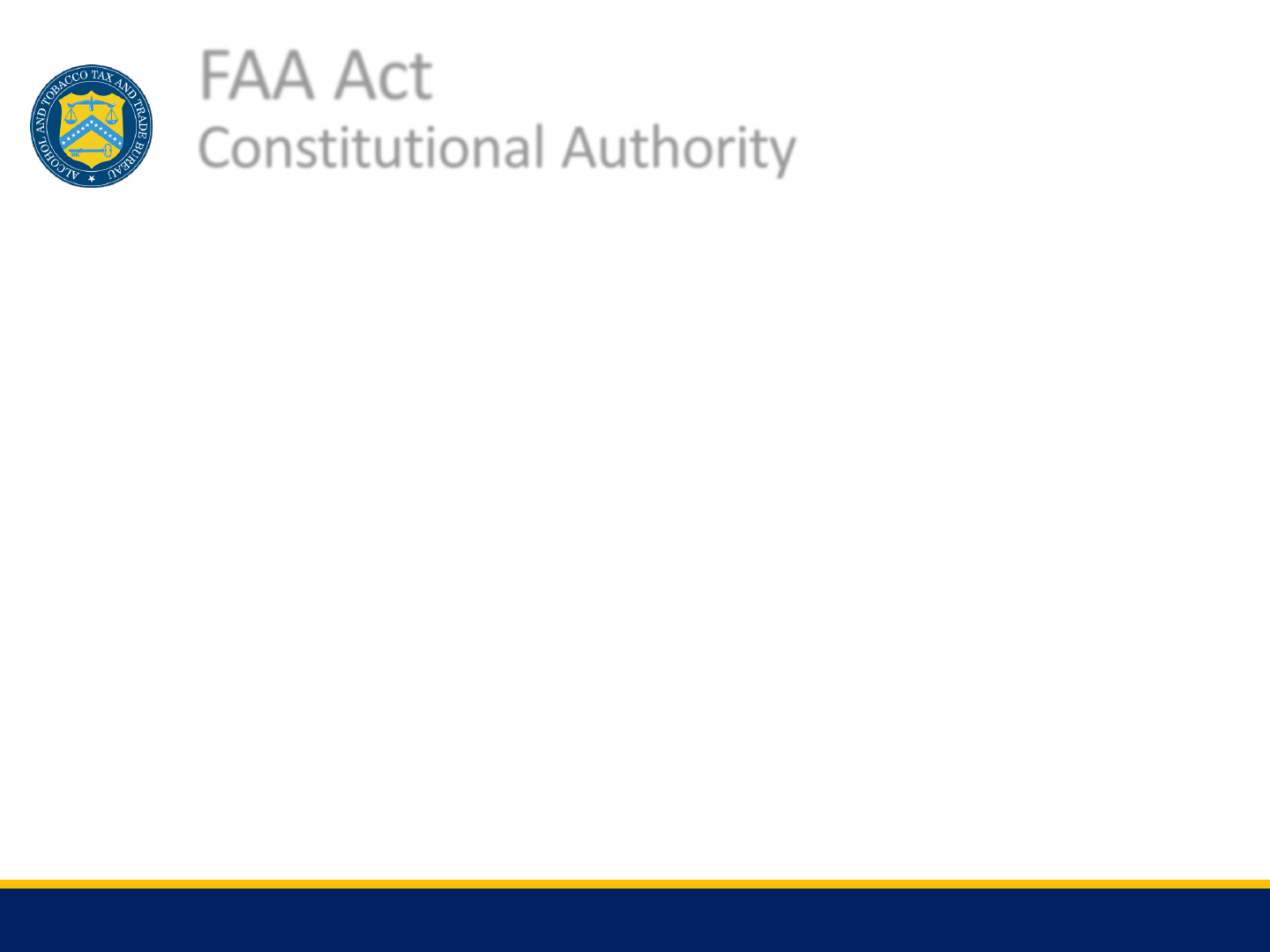
FAA Act
Constitutional Authority
Commerce Clause:
• The Congress shall have the power to “regulate
Commerce with foreign Nations and among the
several states …”
─ Interstate commerce nexus for FAA Act — broad
nexus that generally includes commerce activities
between two or more States
11

FAA Act (cont’d)
Under the FAA Act, producers, importers and
wholesalers of alcohol beverages must register and
receive a basic permit to start operations.
• Importers and wholesalers of malt beverages must
register and obtain a basic permit.
• Producers of malt beverages must file a Brewer’s Notice.
Permits can be revoked, suspended, or annulled.
12
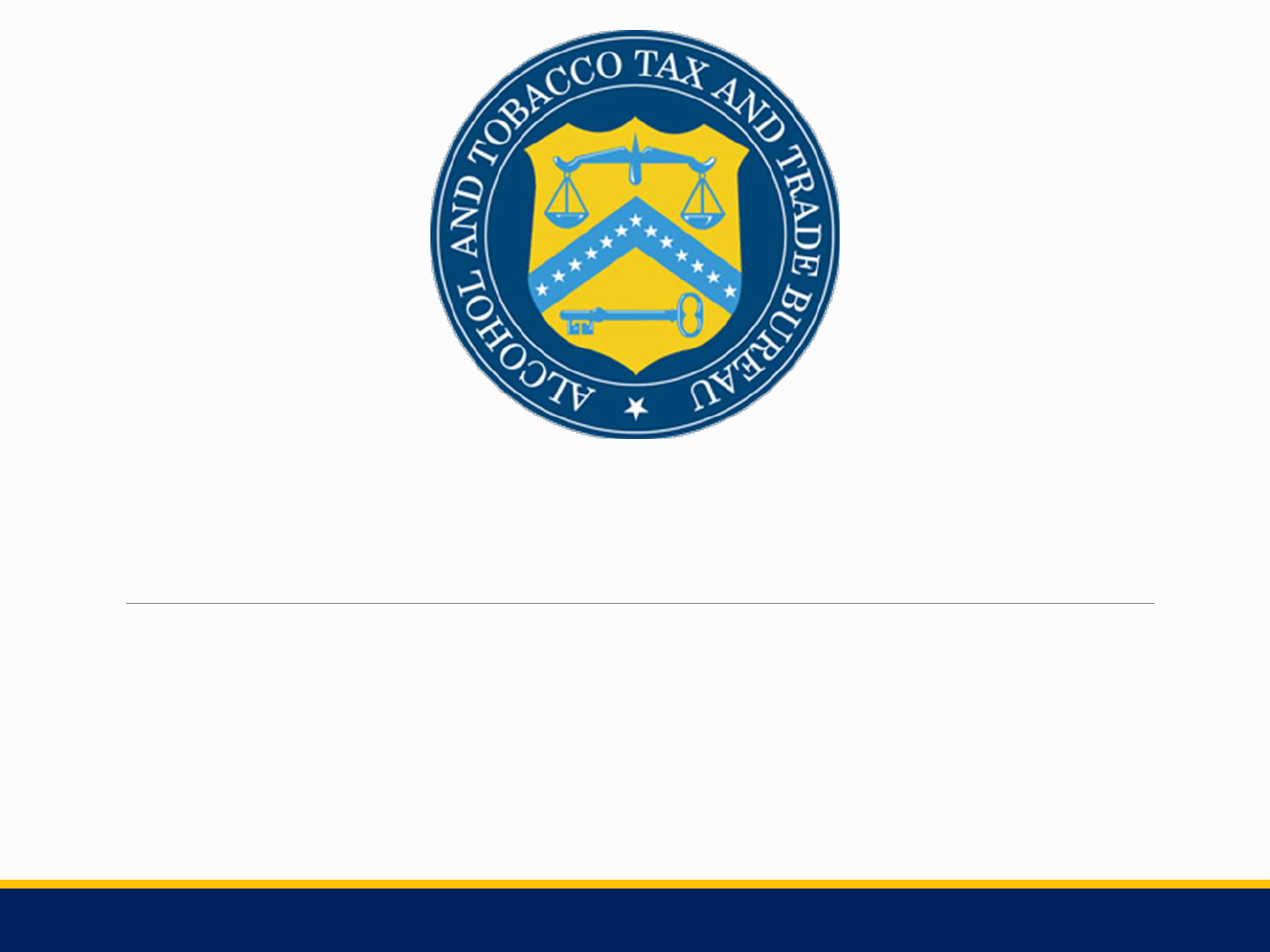
TRADE PRACTICE TERMS

Trade Practice Terms
Industry Member – an entity regulated by TTB
who is engaged in business as a:
• Distiller, brewer, rectifier, blender or other producer;
or
• Importer or wholesaler of distilled spirits, wine or
malt beverages; or
• Bottler, or warehousemen and bottler of distilled
spirits.
Does NOT include agency of a State or political
subdivision, or an officer or employee of such agency.
14

Trade Practice Terms (cont’d)
Trade Buyer – any person who is a wholesaler
or retailer of distilled spirits, wine or malt
beverages.
15

Trade Practice Terms (cont’d)
Inducement – a thing that persuades or
influences someone to do something
• May include goods, property, financial obligation,
etc.
• Interest in a license with respect to premises of a
retailer
• Paying for advertising or display space
16

Trade Practice Terms (cont’d)
Exclusion — Element of proof in exclusive
outlet, tied house and commercial bribery
cases:
• i.e., requirement or inducement to purchase
one person’s alcohol must be “to the exclusion,
in whole or in part” of alcohol sold by others
17

Trade Practice Terms (cont’d)
Exclusion (continued)
Historic interpretation:
• Practice considered a violation of FAA Act if the
induced or required purchases result in retailers
purchasing less of competitors’ alcohol
beverages than they otherwise
would have
18

Trade Practice Terms (cont’d)
Exclusion (continued)
Current interpretation:
• Requires “something more” than the retailer purchasing
less of a competitor’s products to show exclusion.
Two key cases are:
• Foremost Sales v. ATF, 860 F.2d 229
(7th Cir. 1988)
• Fedway Associates v. U.S. Treasury,
976 F.2d 1416 (D.C. Cir. 1992)
19

Trade Practice Terms (cont’d)
Exclusion (continued)
Two elements to exclusion:
• The proscribed practice must place retailer
independence at risk by means of a “tie or link”
between industry member and the retailer or by
any other means of industry member control,
and
• Such practice results in retailer purchasing fewer
of competitors’ products than it otherwise
would have.
20

Trade Practice Terms (cont’d)
Interstate Commerce requirements:
• Primary — Competitor’s products must be sold or
offered for sale in interstate commerce, and
• One of the other three interstate commerce
requirements of 27 U.S.C. 205(a)-(c) must be met.
• Consignment sales have slightly different IC
requirements
21
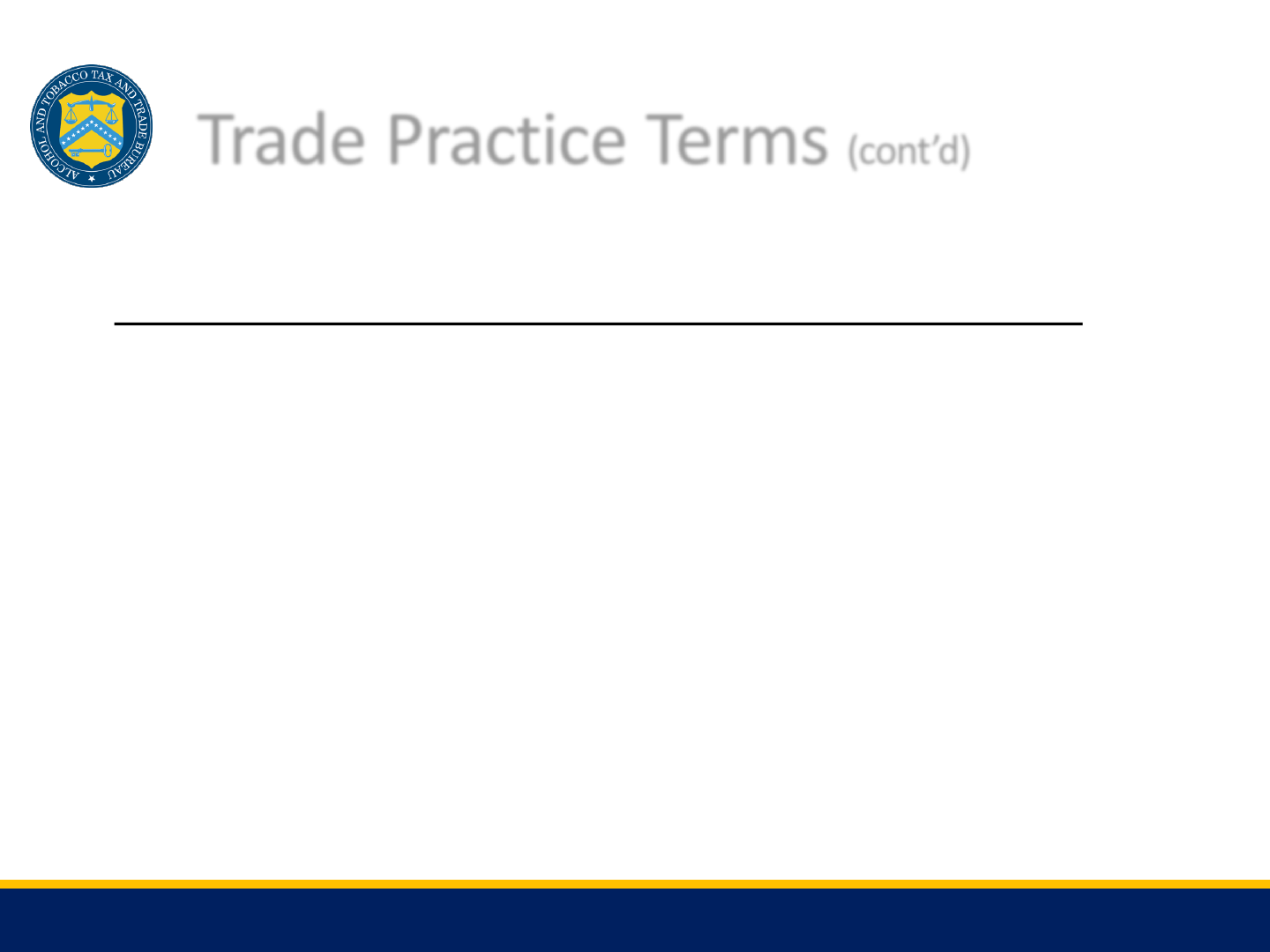
Trade Practice Terms (cont’d)
Interstate Commerce requirements (cont’d):
(1) If such requirement is made in the course of
interstate or foreign commerce, or
(2) If such person engages in such practice to
such an extent as substantially to restrain or
prevent transactions in interstate or foreign
commerce in any such products, or
22

Trade Practice Terms (cont’d)
Interstate Commerce requirements (cont’d):
(3) If the direct effect of such requirement is to
prevent, deter, hinder, or restrict other
persons from selling or offering for sale any
such products to such retailer in interstate
or foreign commerce.
23

FAA Act
Penultimate clause – 27 U.S.C. 205 (f)
In the case of malt beverages, the provision of the FAA
Act with respect to Trade Practices shall apply to
transactions between a retailer or trade buyer in any
State and a brewer, importer, or wholesaler of malt
beverages outside such State only to the extent that the
law of such State imposes similar requirements with
respect to similar transactions between a retailer or trade
buyer in such State and a brewer, importer, or wholesaler
of malt beverages in such State, as the case may be.
24

Trade Practice Terms (cont’d)
Similar State Law — If the excluded product is
a malt beverage (beer), there must be a
similar State law to enable application of the
FAA Act:
• Similar means similar, not same
• Broad interpretation of similarity
25
NOTE: Similar State Law not required for distilled spirits or wine.

TRADE PRACTICES OVERVIEW

Trade Practices Overview
Purposes:
• Prevent wholesaler, importer and
producer control over retailer (and
accompanying corruption and over-
consumption)
• To help keep the playing field level among
industry members
27

Trade Practices Overview (cont’d)
There are four trade practices that are prohibited for
producers, wholesalers, and importers:
1. Tied House
2. Exclusive Outlet
3. Commercial Bribery
4. Consignment Sales
28
27 U.S.C. 205

TIED HOUSE

Tied House
It is unlawful for an industry member to
induce, directly or indirectly, a retailer to
purchase alcohol beverages from the industry
member to the exclusion of alcoholic
beverages offered for sale by other persons.
27 CFR part 6
30
27 U.S.C. 205(b)

Tied House (Cont’d)
31

Tied House — “Means to Induce”
27 U.S.C. 205(b)(1) through (b)(7)
(b)(1) Acquiring or holding…any interest in any
license (State, county or municipal) with
respect to premises of retailer; or
(b)(2) Acquiring any interest in real or personal
property owned, occupied, or used in the
retailer’s business.
• Note: 100% ownership is not prohibited.
(27 CFR 6.27 and 6.33)
27 CFR part 6
32

Tied House — “Means to Induce”
27 U.S.C. 205(b)(1) through (b)(7) cont’d
(b)(3) Giving, renting, lending, or selling to retailer,
equipment, fixtures, signs, supplies, money,
services, or other thing of value. – (Except for
27 CFR part 6 Subpart D exceptions).
(b)(4) Paying or crediting a retailer for any
advertising, display or distribution service.
27 CFR part 6
33

Tied House — “Means to Induce”
27 U.S.C. 205(b)(1) through (b)(7) cont’d
(b)(5) Guaranteeing any loan or repaying retailer’s
financial obligation.
(b)(6) Extending credit to a retailer for a “period of
time in excess of 30 days from the date of
delivery.”
(b)(7) Requiring the retailer to take and dispose of a
certain quota of alcohol beverages.
27 CFR part 6
34

Tied House — Examples
• Industry member provides free labor to reset
stock on a retailer’s premises (other than stock
offered for sale by the industry member).
• Industry member purchases or rents display,
shelf, storage, or warehouse space from a
retailer (i.e. slotting allowance).
27 CFR part 6
35
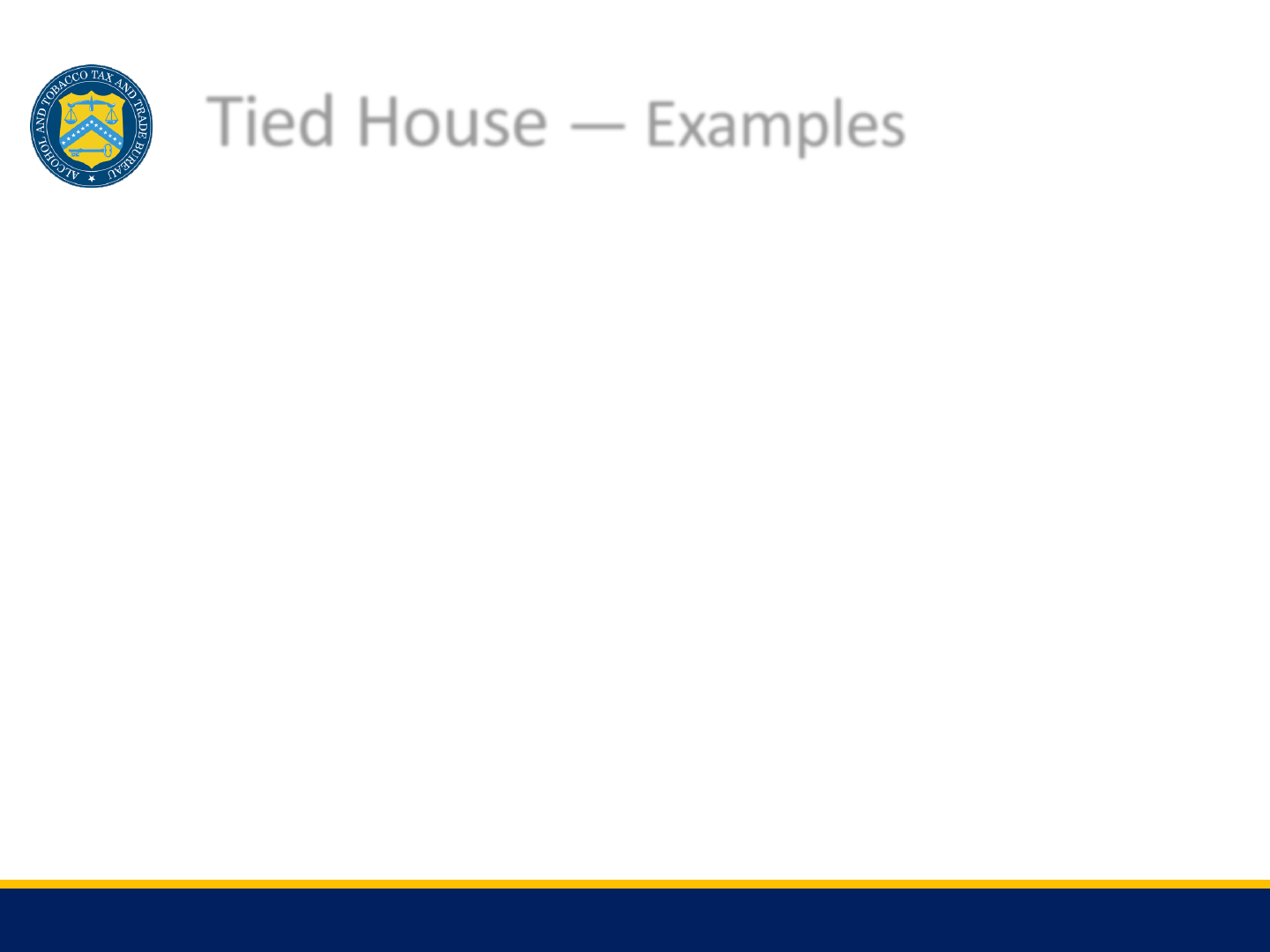
Tied House — Examples
• Industry member pays for live entertainment for
an on-premise retailer in exchange for product
promotion and preferential display space within
the retailer’s premises.
• Industry member informs a retailer that they
must purchase a slow-moving alcohol beverage
product in order to obtain a product that is in
high demand.
27 CFR part 6
36

Tied House — Subpart D Exceptions
Included among the items listed in the Subpart D
exceptions are:
• Product displays;
• Point of sale advertising materials;
• Consumer tasting/sampling at retail locations;
• Limited equipment and supplies;
• Stocking, rotation and pricing service.
There are limitations and conditions for all Subpart D
exceptions. Generally, any exceptions to 27 U.S.C.
205(b)(3) must be of little value.
27 CFR part 6
37

Tied House —
Recordkeeping Requirements
27 CFR part 6
38
For exception to apply, industry members must keep
and maintain records on premises for certain items
furnished to retailers:
• Product displays
• Equipment and supplies
• Samples
• Coupons
• Participation in retailers association activities
• Merchandise
27 CFR 6.81(b)

Tied House —
Recordkeeping Requirements (Cont’d)
27 CFR part 6
39
Required records must include:
• Name and address of retailer
• Date furnished
• Item furnished
• Industry member’s cost of item
• Charges to retailer (if any)
27 CFR 6.81(b)

Tied House
When does a violation occur?
1. Inducement
• Industry Member to Retailer---unless industry member wholly owns
retailer.
2. Interstate Commerce
3. Exclusion
4. Similar State Law (Malt Beverages Only)
NOTE: If all elements are not established, there is no violation.
27 CFR part 6
40

EXCLUSIVE OUTLET

Exclusive Outlet
It is unlawful for an industry member to
directly or indirectly require a retailer, “by
agreement or otherwise” to purchase alcohol
from that industry member to the exclusion
of alcohol sold or offered for sale in interstate
or foreign commerce by others.
27 CFR part 8
42
27 U.S.C. 205(a)

Exclusive Outlet (Cont’d)
43

Exclusive Outlet (Cont’d)
• Voluntary industry member-retailer
purchase agreements (Contracts)
• Coercion through acts or threats of
physical or economic harm
27 CFR part 8
44
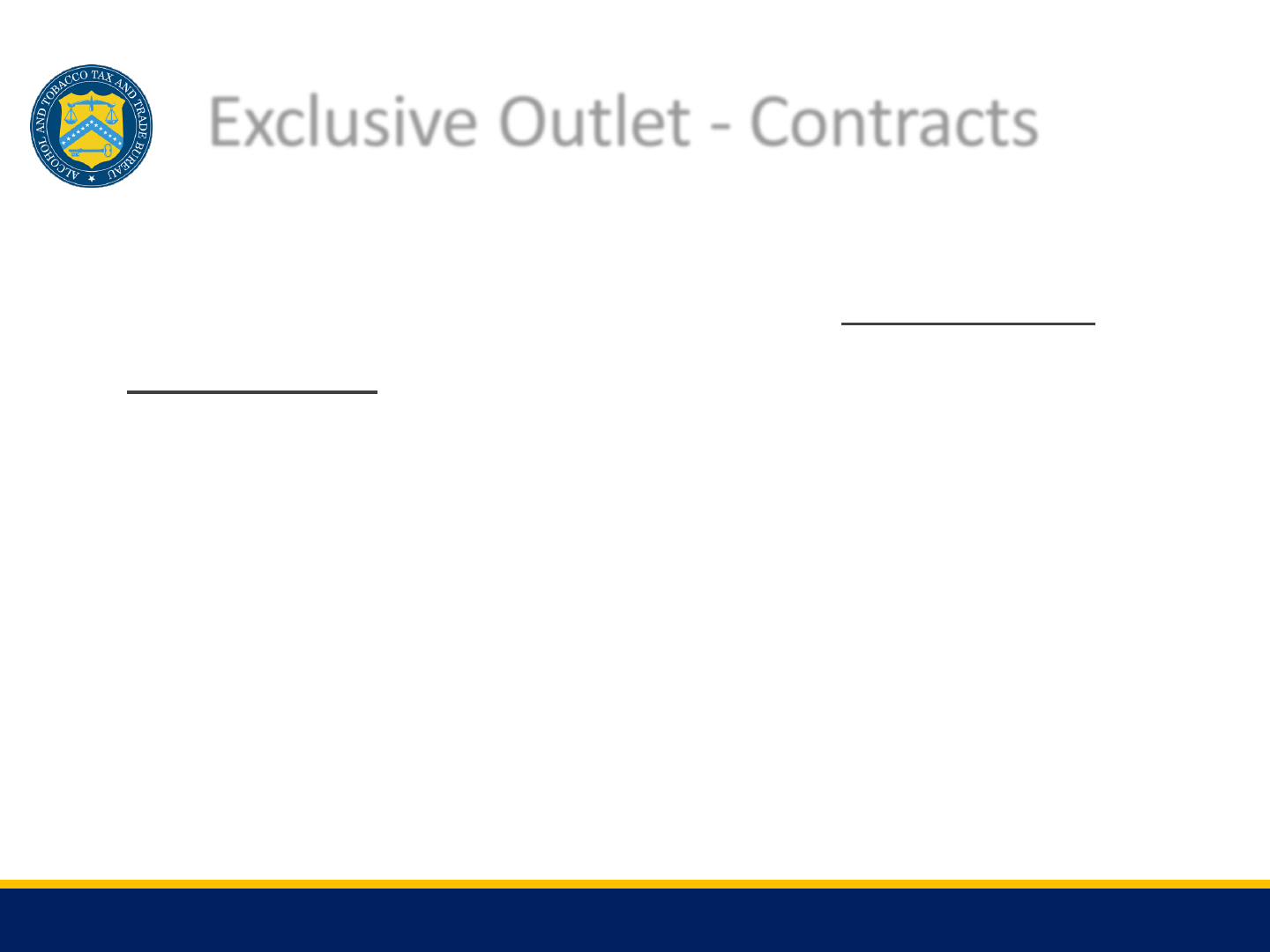
Exclusive Outlet - Contracts
Any contract or agreement, written or
unwritten, which has the effect of
requiring the retailer to purchase
alcohol beverage products from the
industry member beyond a single sales
transaction is prohibited.
(27 CFR 8.22)
27 CFR part 8
45

Exclusive Outlet - Contracts (Cont’d)
(a) An advertising contract between an
industry member and a retailer with the
express or implied requirement to
purchase the advertiser's products; or
27 CFR part 8
46

Exclusive Outlet - Contracts (Cont’d)
(b) A sales contract awarded on a competitive bid
basis which has the effect of prohibiting the retailer
from purchasing from other industry members by:
(1) Requiring that for the period of the
agreement, the retailer purchase a product or
line of products exclusively from the industry
member; or
(2) Requiring that the retailer purchase a specific
or minimum quantity during the period of the
agreement.
27 CFR part 8
47

Exclusive Outlet –
Contract Example
ABC-Wholesaler enters into a sales contract with
The Pub, a liquor retailer, in which The Pub agrees
to purchase all of its alcohol beverages exclusively
from ABC to the exclusion of alcohol beverages
offered for sale by others in interstate commerce.
In exchange, ABC will sell its products to
The Pub at a very favorable cost.
27 CFR part 8
48

Exclusive Outlet
When does a violation occur?
1. Requirement by agreement or otherwise
• Retailer must purchase from industry member
2. Interstate commerce
3. Exclusion (of other industry member’s products)
4. Similar State Law (Malt Beverages Only)
NOTE: If all elements are not established, there is no violation.
27 CFR part 8
49
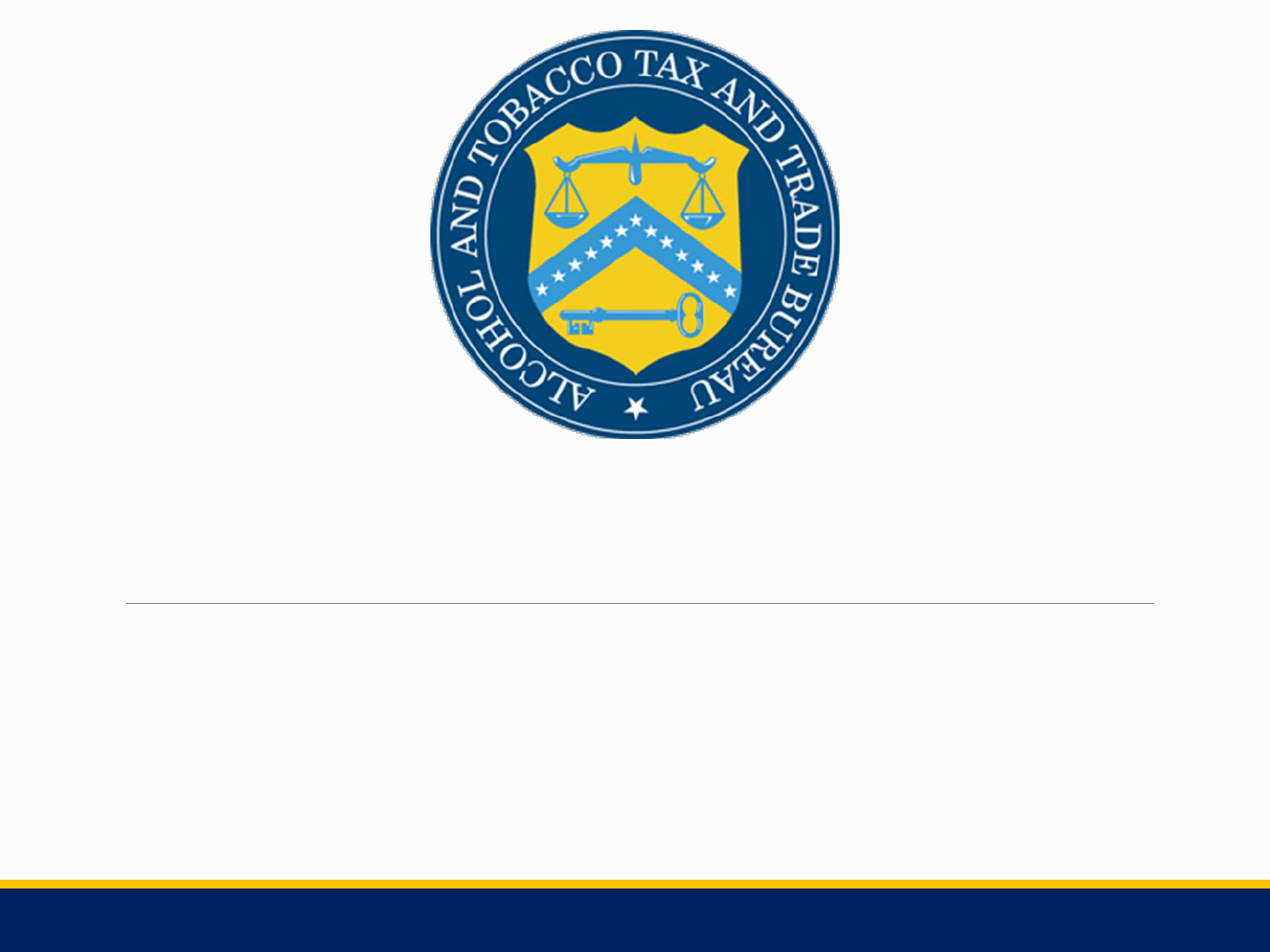
COMMERCIAL BRIBERY

Commercial Bribery
It is unlawful for an industry member to induce any
“trade buyer” (wholesaler/retailer) to purchase
alcohol from the industry member to the exclusion
of those sold by others by:
• Commercial bribery; or
• Offering or giving any bonus, premium or
compensation to employees, officers, or
representatives of trade buyer.
27 CFR part 10
51
27 U.S.C. 205(c)
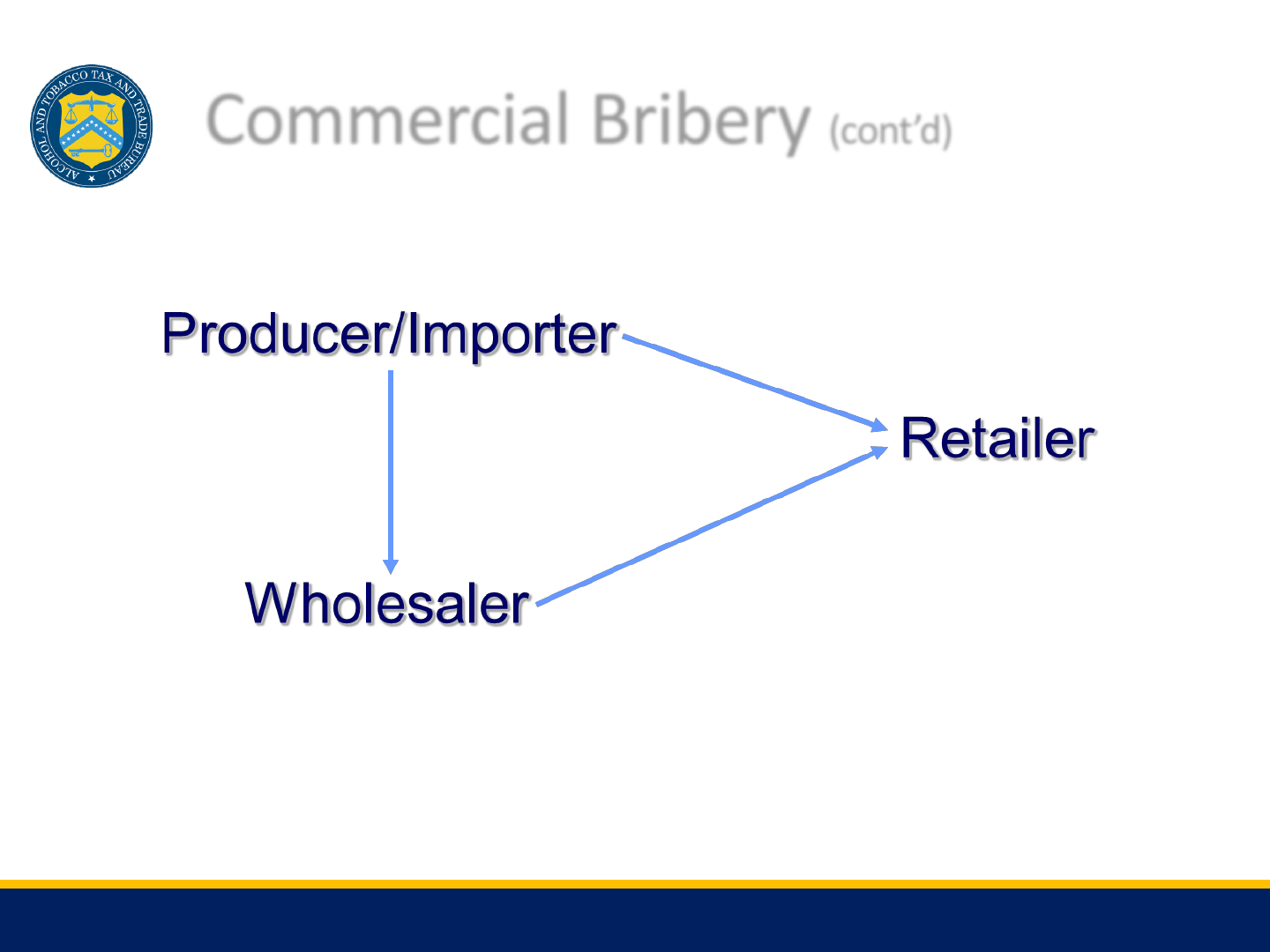
Commercial Bribery (cont’d)
27 CFR part 10
52

Commercial Bribery (cont’d)
“Commercial Bribery” under section
205(c)(1) means:
• The practice of sellers paying money or making
gifts to employees or agents to induce them to
promote purchases by their own employers from
the sellers offering the secret inducements.
27 CFR part 10
53
27 U.S.C. 205(c)

Commercial Bribery (cont’d)
• Things of value given to officers, employees, or
representatives of trade buyers that promote
sales of industry member’s products can
indirectly induce the trade buyers to purchase
more of those products (27 U.S.C. 205(c)(2))
• Note: Industry member may give things of
value to wholesale entity unless wholesaler is
mere conduit to the employees (27 CFR 10.23)
27 CFR part 10
54

Commercial Bribery - Example
An industry member contacts a purchasing agent
for a chain of restaurants to buy and sell its
alcoholic beverages in exchange for a weekly cash
incentive of $200 to the agent. The purchasing
agent agrees, and secretly receives the payment by
check through the mail and also stops buying a
competitor’s product. The purchasing agent’s
employer doesn’t know anything about it.
27 CFR part 10
55

Commercial Bribery - Example
(cont’d)
Sales Contests:
• Industry member offers gift or bonus to
trade buyer’s employees to promote sales
of industry member’s products. This sales
contest indirectly induces the trade buyer
to purchase more of those products.
27 CFR part 10
56

Commercial Bribery (cont’d)
When does a violation occur?
1. Inducement (to employee or representative)
• Industry member to trade buyer (wholesaler or retailer).
2. Interstate Commerce
3. Exclusion
4. Similar State Law (Malt Beverages Only)
NOTE: If all elements are not established, there is no violation.
27 CFR part 10
57

CONSIGNMENT SALES

Consignment Sales
Unlawful to sell, offer to sell, or contract to sell
alcohol beverages to trade buyer (or for trade
buyer to purchase or offer/contract to
purchase):
• On consignment, or
• Under conditional sale, or
• With the privilege of return, or
27 CFR part 11
59
27 U.S.C. 205(d)

Consignment Sales (cont’d)
Unlawful to sell (continued):
• On any basis other than a bona fide sale, or
• Where any part of the transaction involves the
acquisition of other wine, distilled spirits, or
malt beverages from the trade buyer
27 CFR part 11
60
27 U.S.C. 205(d)
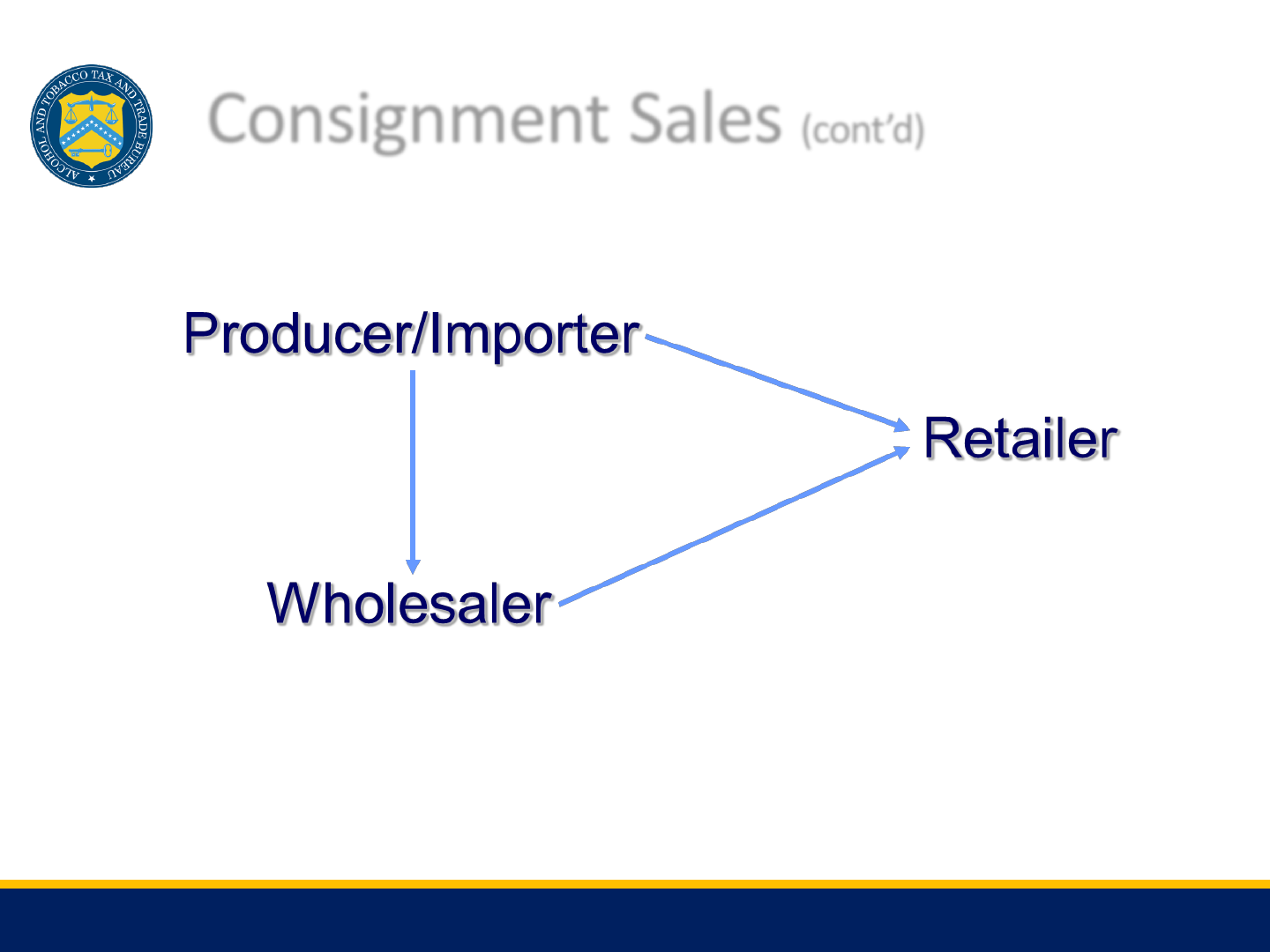
Consignment Sales (cont’d)
27 CFR part 11
61

Consignment Sales Exception
27 CFR part 11
62
Merchandise returns for ordinary and usual
commercial reasons do not constitute consignment
sales, such as:
• Error in delivery (27 CFR 11.33)
• Defective product (27 CFR 11.32)
• Product unlawful to sell (27 CFR 11.34)

Consignment Sales Exception
(Cont’d)
27 CFR part 11
63
Ordinary and usual commercial reasons (continued):
• Termination of retail business (27 CFR 11.35) or
wholesale franchise (27 CFR 11.36)
• Change in product (27 CFR 11.37)
• Discontinued product (27 CFR 11.38)
• Seasonal dealer (27 CFR 11.39)

Consignment Sales Exception
(Cont’d)
27 CFR part 11
64
Merchandise returns for reasons that
are NOT considered ordinary and/or
usual include:
• Overstocked or slow moving products (27
CFR 11.45)
• Seasonal products (27 CFR 11.46)

Consignment Sales - Example
27 CFR part 11
65
• An industry member (wholesaler, importer)
sells a retailer 300 cases of alcohol beverages
with the understanding that if it is not sold, it
may be returned.
• Importer sells to wholesaler under condition
that wholesaler is not required to pay for
alcohol until sold to retailer.

Consignment Sales
27 CFR part 11
66
When does a violation occur?
1. Consignment Sale
- To sell, offer for sale, or contract to sell, OR, to purchase,
offer to purchase, or contract to purchase.
2. Interstate Commerce
3. Similar State Law (Malt Beverages Only)
No Exclusion Requirement - if the sale, purchase, offer, or
contract is made in the course of interstate or foreign commerce.

Summary
• Trade Practice Prohibitions:
• Tied House
• Exclusive Outlet
• Commercial Bribery
• Consignment Sales
• All elements of a violation must be present for there
to be a violation.
• Exclusion element is required for all but
Consignment Sales
67

TTB GUIDANCE

TTB Guidance
Industry Circular 2012-1
69
Guidance Regarding Industry Members' Participation
in Retail Programs
• Discusses the use of third-party marketing companies.
• Subpart D exceptions are only applicable to the
prohibition of providing things of value under 27 U.S.C.
205(b)(3) and do not apply to other provisions of the FAA
Act.
• Subpart D exceptions cannot be used as a subterfuge to
violate another provision of the FAA Act.

TTB Guidance
Industry Circular 2012-2
70
Tie-In Sales - An Unlawful Trade Practice
• Tie-in sale is when a industry member requires
a retailer to purchase one product in order to
obtain another product.
• Tie-in sales are prohibited inducements under
27 U.S.C. 205(b)(7).

TTB Guidance
Ruling 2016-1 and FAQs
71
The Shelf Plan and Shelf Schematic Exception to
the “Tied House” Prohibition, and Activities
Outside Such Exception:
• Allows furnishing a retailer with a recommended
shelf plan or schematic.
• Provides general guidance concerning promotional
activities commonly associated with category
management programs.
• Reminds industry members that if a thing of value is
not specifically exempted in Subpart D, it is an
inducement.

TTB Guidance
Ruling 2017-2 Revised
72
Freshness Dating and Allowable Returns of Malt
Beverage Products under the FAA:
Malt beverages may be returned under the following
conditions:
• The brewer has pre-established policies and
procedures in place across various product lines that
specify the date the retailer must pull the product;
• Such brewer’s freshness return/exchange policies
and procedures are readily verifiable and
consistently followed by the brewer;

TTB Guidance
Ruling 2017-2 Revised (cont’d)
73
Conditions (continued):
• The container has identifying markings that
correspond with this date; and
• The malt beverage product pulled by the trade buyer
may not re-enter the retail marketplace.

Trade Practice Proceedings

Consequences
Violations of the FAA Act Trade Practice
prohibitions can result in:
• Criminal charges
• Injunction or consent decree
• Revocation of Basic Permit
• Suspension of Basic Permit
• Offer in Compromise
75

FAA Act Permit Proceedings
• Permit may be annulled if Secretary finds it
was obtained through fraud,
misrepresentation, or concealment of
material fact.
• Permit may be revoked if permittee
has not engaged in business for more
than 2 years.
76

FAA Act Permit Proceedings
(Cont’d)
• Permit may be revoked or suspended if
permittee willfully violates any conditions of
its basic permit:
- However, can only be suspended for
first-time violation
• As an alternative to suspension or
revocation, TTB can accept offers in
compromise (27 U.S.C. 207)
77

Other Proceedings
Violations of FAA Act Trade Practice
prohibitions can result in criminal charges
against any person who violates the Act:
• Misdemeanor
• $1,000 fine for each offense
In consignment sale context, can include the
retailer
78

Trade Practice Cases
Chicago - Press Release January 2009
─ Glazer’s Distributors of Illinois, Inc. - $225,000
─ Southern Wine & Spirits of Illinois, Inc. - $225,000
─ Wirtz Corporation - $130,000
─ Distinctive Wine & Spirits, LLC - $110,000
─ Johnson Brothers Liquor Company of Illinois - $40,000
─ Vin Divino, Ltd. - $30,000
─ Stoller Wholesale Wine & Spirits, Inc. - $18,000
─ Fine Vines, LLC - $12,000
─ Shaw-Ross International Importers - $10,000
─ Wein-Bauer Distributing, Inc. - $3,000
79

Trade Practice Cases (cont’d)
Las Vegas – Press Release May 2011
─Diageo North America, Inc. - $650,000
─Pernod Ricard USA, LLC - $300,000
─Moet Hennessey USA, Inc. - $275,000
─Bacardi USA - $262,500
─Future Brands, LLC - $250,000
─E. & J. Gallo Winery - $225,000
80

Recent Trade Practice Cases
• Offer in Compromise of $450,000 from
MillerCoors, LLC (Consignment Sales)
• Offer in Compromise of $300,000 from
Anheuser-Busch, LLC (Consignment Sales)
• Offer in Compromise of $750,000 from
Craft Beer Guild, LLC (Tied-House)
81

Most Recent
• Offer in Compromise of $900,000 from
Warsteiner Importers Agency, Inc.
82

Tied House OIC Trend
83
$80,300.00
$327,083.33
$750,000.00
$900,000.00
$0.00
$100,000.00
$200,000.00
$300,000.00
$400,000.00
$500,000.00
$600,000.00
$700,000.00
$800,000.00
$900,000.00
$1,000,000.00
2009 2010 2011 2012 2013 2014 2015 2016 2017 2018

PRACTICAL EXERCISES

Practical Exercise #1
A Wholesaler enters into a 9-month advertising
contract with Bob’s Racetrack, a retailer. Under the
terms of the contract, Bob’s Racetrack will receive
$50,000 and agrees to purchase the Wholesaler’s
malt beverages throughout the 9-month contract
period. The Wholesaler will be able to put up
signage throughout the racetrack advertising its malt
beverage products.
85

Practical Exercise #1 (Cont’d)
Is this an exclusive outlet arrangement?
27 CFR 8.22 prohibits:
“Any contract or agreement, written or
unwritten, which has the effect of requiring the
retailer to purchase distilled spirits wine or malt
beverages from the industry member beyond a
single sales transaction.”
86

Practical Exercise #1 (Cont’d)
Does the practice place retailer independence at
risk?
• Bob’s Racetrack has a continuing obligation to purchase
or otherwise promote the Wholesaler’s product — 27
CFR 8.54(c)
• Bob’s Racetrack has a commitment not to terminate its
relationship with the Wholesaler with respect to
purchase of the Wholesaler’s products — 27 CFR 8.54(d)
• This practice may also hamper the free economic choice
of Bob’s Racetrack to decide which products to purchase
— 27 CFR 8.54(a)
87

Practical Exercise #2
A Wholesaler enters into a 12-month sales contract
with a retailer of fine wines. Under the terms of the
contract, the retailer agrees to purchase all of its
French burgundy wines exclusively from the
wholesaler for the duration of the 12-month period.
In return, the wholesaler offers a discounted price.
88

Practical Exercise #2 (Cont’d)
Is this an exclusive outlet arrangement?
The contract clearly requires purchases beyond a
single sales transaction — 27 CFR 8.22
89

Practical Exercise #2 (Cont’d)
Does this practice lead to exclusion?
This contract requires the purchase of all French
burgundy wines exclusively from the wholesaler.
This is a practice that per se results in exclusion
under 27 CFR 8.52(b).
90

Practical Exercise #3
A Wholesaler enters into a 12-month contract with
a local tavern that caters to an affluent clientele.
Under the terms of the contract, the wholesaler will
provide several wines at a very favorable price
throughout the contract period. The products are
being supplied on an as-needed basis and there are
no minimum quantity purchase requirements.
91

Practical Exercise #3 (Cont’d)
Is this an exclusive outlet arrangement?
Contract meets the requirements
of 27 CFR 8.53 – Practice not resulting in exclusion:
• Supply contract for 1 year or less
• Industry member agrees to sell on “as-needed basis”
• No minimum quantity purchase requirements
92

Practical Exercise #4
Bob’s Imports USA, an importer of alcoholic
beverages, sponsored a 10-day all expense paid trip
to the Bahamas for the top 3 sales people of a
Wholesaler who sold the most Bob’s Rum products
over the 3-month period of June, July, and August
2017. The value of the trip to each winner was
approximately $2,000.
93

Practical Exercise #4 (Cont’d)
Is this commercial bribery?
• There are no secret payments
27 U.S.C. 205(c)(1)
• “Sales contests sponsored by an industry
member which offer prizes directly or indirectly
to trade buyer officers, employees, or
representatives are inducements within the
meaning of the act.” (27 CFR 10.21 and 10.24)
94

Practical Exercise #4 (Cont’d)
Does it place the wholesaler’s independence
at risk?
• Could “hamper the free economic choice” of
wholesaler to determine which products to buy
(27 CFR 10.54(a)), or
• Could be considered a continuing obligation to
purchase or otherwise promote the importer’s
product (27 CFR 10.54(c))
95

Practical Exercise #5
Angelo’s Imports, a beer importer provides tap
systems to a new chain of restaurants in exchange
for its products being offered on tap.
96

Practical Exercise #5 (cont’d)
Is this an inducement (assuming similar state
law)?
• The industry member is paying for display space
at a retail establishment (27 U.S.C. 205(b)(2) and
4); 27 CFR 6.35 and 6.56)
• The industry member is also furnishing a thing of
value to the retailer (27 CFR 6.41)
97

Practical Exercise #5 (cont’d)
Is this a risk to the retailer’s independence?
• This is a slotting allowance under 27 CFR
6.152(b)
98

Practical Exercise #6
Bob’s Distillery, in order to introduce a new whiskey
to the market, enters into an agreement with a
Wholesaler. As part of the agreement, Bob’s
Distillery will accept the return of any product that
doesn’t sell within 90 days.
99

Practical Exercise #6 (Cont’d)
Is this a consignment sale?
Sale of the whiskey involves the distiller agreeing
to buy back slow moving product from the
wholesaler/trade buyer (27 U.S.C. 205(d); 27 CFR
11.21(c) and 11.45)
Remember: Proof of exclusion is not required for
consignment sale if the sale is made in the course of
interstate commerce
100

Questions?
101
• We are here to answer your questions.
• Additional questions can be submitted in
writing to:
TradePractices@ttb.gov
